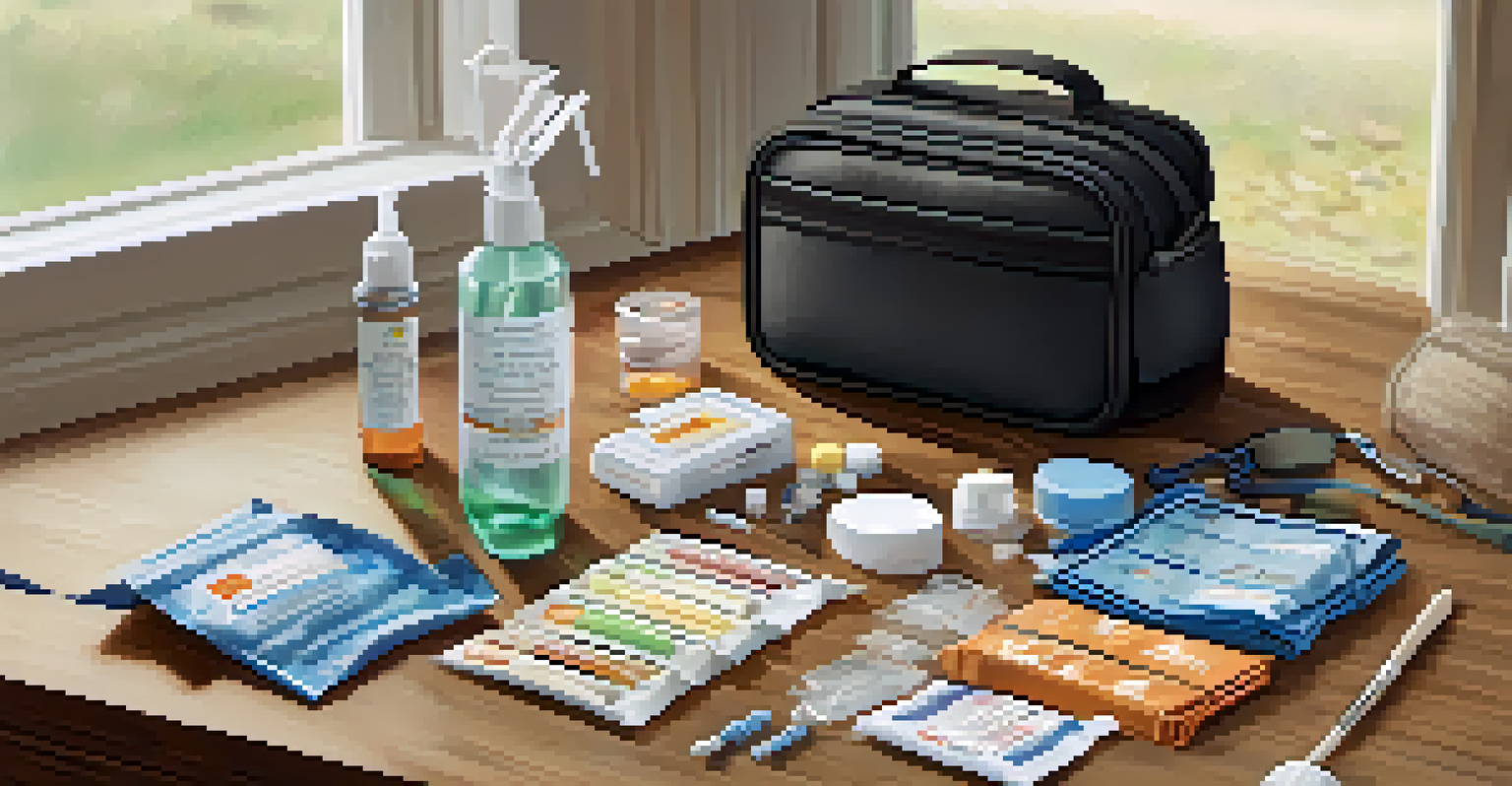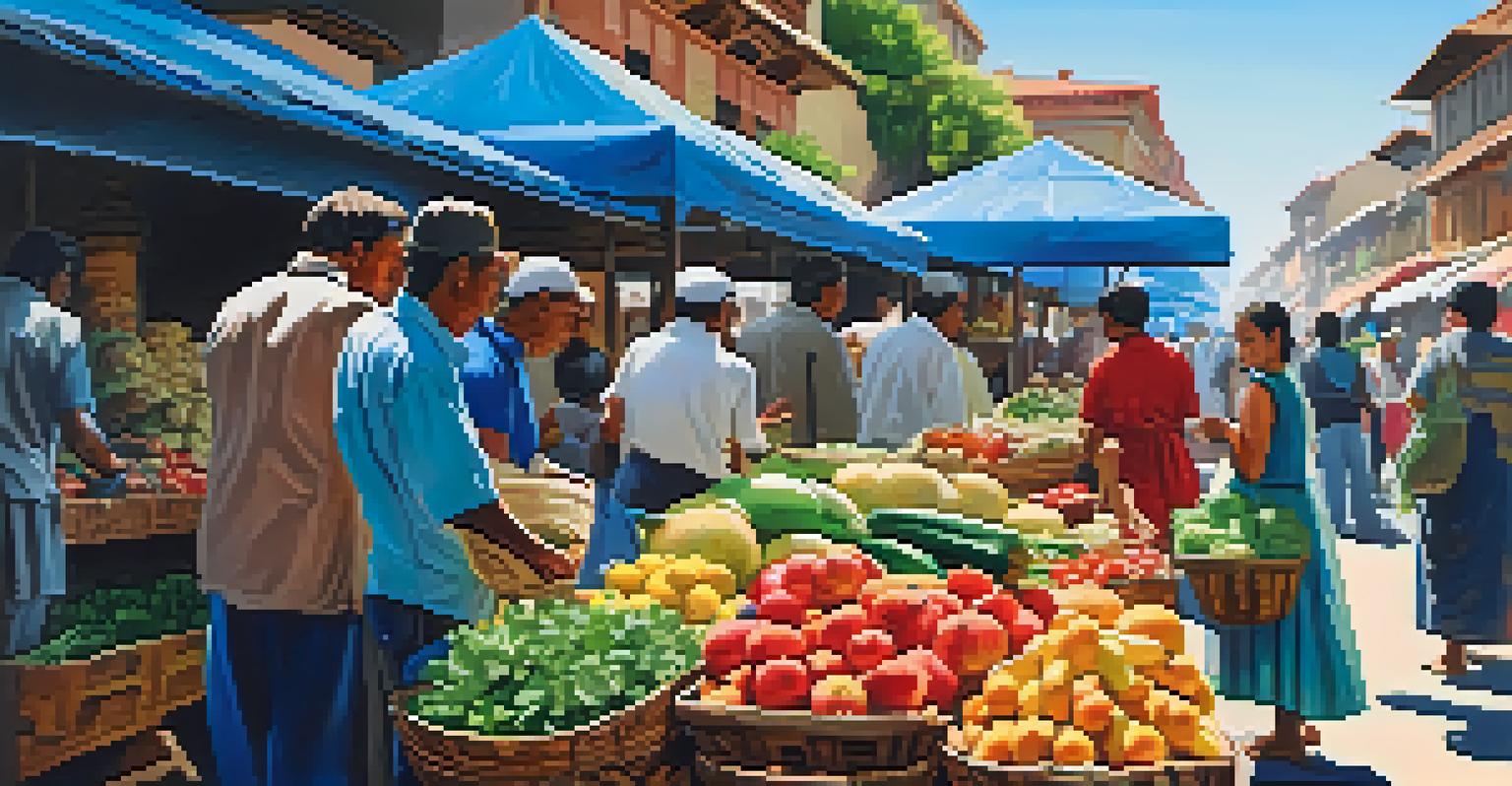How to Stay Safe While Traveling Solo: Health Tips

Research Your Destination's Health Risks Before You Go
Before you embark on your solo journey, it’s crucial to research any health risks associated with your destination. Different places have varying health concerns, such as endemic diseases, food safety issues, or even environmental hazards. For example, if you're heading to a tropical region, you might need vaccinations for diseases like yellow fever or malaria.
Traveling – it leaves you speechless, then turns you into a storyteller.
Check the CDC or World Health Organization websites for up-to-date information on health advisories. Understanding the local health landscape can help you prepare adequately, whether that means packing specific medications or knowing where to find medical facilities. Plus, being informed gives you peace of mind as you explore new places.
Remember to also take note of local customs related to health and hygiene. In some cultures, certain foods might be safe to eat, while in others they could pose a risk. By familiarizing yourself with these details, you can navigate your culinary adventures more safely.
Pack a Travel Health Kit for Emergencies
A well-prepared travel health kit can be a lifesaver when you're on the road. Include basic supplies like band-aids, antiseptic wipes, pain relievers, and any personal medications you may need. It’s also wise to have items for common travel ailments, such as upset stomach remedies or insect repellent.

Consider adding a few first-aid essentials, like tweezers and scissors, for unexpected situations. Packing this kit not only prepares you for minor injuries but can also save you time and stress trying to find a pharmacy in a foreign place. After all, when you're traveling solo, you don't want to deal with unnecessary hassles.
Research Health Risks Before Travel
Understanding local health risks enables better preparation and peace of mind during your solo journey.
Make sure to check the laws regarding bringing medications into your destination country, as some medicines may be restricted. Keeping everything organized in a waterproof bag can also protect your kit from spills or moisture, ensuring it’s ready when you need it.
Stay Hydrated and Eat Well on Your Travels
Staying hydrated is vital, especially when you're on the move. Dehydration can lead to fatigue and illness, which can quickly dampen your solo adventure. Always carry a reusable water bottle and refill it whenever possible, opting for bottled water in areas where tap water isn’t safe to drink.
Safety isn’t expensive, it’s priceless.
Eating well is equally essential for your health while traveling. Try to choose nutritious food options whenever possible, even if you're tempted by street food. Incorporating fruits and vegetables into your diet can help boost your immune system and keep you feeling energized.
However, if you’re trying local cuisine, be mindful of food safety. Stick to freshly prepared dishes and avoid raw or undercooked foods in places where hygiene practices may be questionable. This way, you can enjoy the flavors of your destination without compromising your health.
Practice Good Hygiene to Avoid Illness
Maintaining good hygiene is one of the simplest yet most effective ways to stay healthy while traveling solo. Wash your hands regularly, especially before meals and after using public facilities. If soap and water aren’t available, carry hand sanitizer with at least 60% alcohol to help eliminate germs.
Be cautious about touching your face, particularly your eyes, nose, and mouth, as these are common entry points for viruses. It's a small but impactful habit that can significantly reduce your risk of getting sick while exploring new places. Additionally, keep your personal items, such as your phone and wallet, clean as they often harbor bacteria.
Pack a Travel Health Kit
A well-stocked travel health kit helps you handle minor injuries and common ailments while on the road.
In crowded areas, consider wearing a mask, especially during flu season or if respiratory illnesses are prevalent. This not only protects you but also shows respect for the health of those around you. Ultimately, good hygiene practices are a cornerstone of a safe solo travel experience.
Know Local Emergency Contacts and Procedures
Before you travel, familiarize yourself with local emergency contacts, such as hospitals, police stations, and embassies. Having this information at your fingertips can be crucial in an emergency situation. For instance, if you fall ill or face a security issue, knowing who to call can save precious time and potentially make all the difference.
It’s also wise to have a plan in place for emergencies. Share your itinerary with a trusted friend or family member so they know your whereabouts. This way, if something goes awry, someone will be aware and can check in on you.
Lastly, consider downloading local apps that provide emergency services information or even maps to nearby hospitals. By being proactive about these details, you empower yourself to handle unforeseen circumstances more effectively.
Stay Connected with Technology and Loved Ones
In today's digital age, technology can be your best friend while traveling solo. Keep your smartphone charged and use it to stay connected with friends and family back home. Regular check-ins can provide not only peace of mind for your loved ones but also a safety net if something goes wrong.
Consider using apps that allow for real-time location sharing. This way, someone can track your journey and stay updated on your whereabouts. In case of an emergency, this feature can provide crucial information for those trying to help you.
Stay Connected for Safety
Using technology to stay connected with loved ones enhances your safety and provides a support system during solo travels.
Moreover, using travel apps can streamline your experience. From navigation to language translation, having these tools at your disposal can help you feel more secure and confident while exploring unfamiliar territories.
Be Aware of Your Surroundings and Trust Your Instincts
Staying aware of your surroundings is key to ensuring your safety while traveling alone. Whether you're wandering through a bustling market or exploring a quiet street, keep your eyes and ears open for anything unusual. Avoid distractions, like excessive phone use, as they can make you an easy target for theft or scams.
Trusting your instincts is equally important. If something feels off or you sense danger, don’t hesitate to remove yourself from the situation. Your intuition is a powerful guide, and listening to it can help you avoid potentially risky situations.

Engaging with locals can also provide valuable insights into safe areas and places to avoid. Building a rapport with residents not only enriches your experience but can also offer you a sense of security as you navigate new environments.
Consider Travel Insurance for Extra Protection
Travel insurance may seem like an extra expense, but it can provide invaluable protection when traveling solo. It can cover unexpected medical emergencies, trip cancellations, or lost belongings, giving you peace of mind. For example, if you fall ill abroad, having insurance can ensure you receive the medical care you need without worrying about the costs.
When choosing a policy, look for comprehensive coverage that suits your travel needs. Some plans even cover activities like hiking or skiing, which is essential if you're planning to engage in adventure sports. Make sure to read the fine print to understand what is included and what isn’t.
Incorporating travel insurance into your plans is a small step that can have a big impact on your overall experience. With this safety net, you can focus on enjoying your journey, knowing that you're protected against the unexpected.